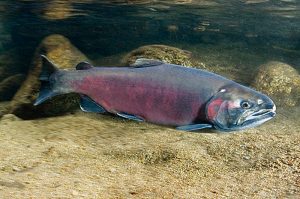On remand from the California Supreme Court, the Central Coast Forest Association and Big Creek Lumber Company lost again in the state appeals court. They have been arguing that coho salmon did not occur naturally in rivers south of San Francisco, and that hatchery coho were harming native steelhead. The state Fish and Game Commission had found otherwise.
From the judge: “Petitioners have not offered sufficient evidence that the current inhabitants of the streams south of San Francisco are directly the result of out-of-state hatchery stock,” he wrote. “Moreover, the Commission relied on recent genetic data, the results of which rule out the claim that hatchery fish replaced the native stock south of San Francisco.”
From an environmental intervenor attorney: “The petitioners/plaintiffs are timber companies, not advocates for steelhead,” he said, noting that the appellate court’s ruling blames timber harvesting in part for the decline in coho populations. “It seems pretty transparent that their interests lie in reducing restrictions on timber operations, not protecting salmon or steelhead,” Evans added. “Protections for waterways that contain coho salmon would also benefit steelhead trout in those same rivers. So, in essence, greater protections against sediment, erosion, roads, and increases in water temperature due to timber harvest would benefit both salmon and steelhead, which have similar ecological needs.”
From the plaintiffs’ attorney: “It’s sad to see the deepening corruption of science in California. It’s just another layer of regulation and stupidity,” he said. “This decision is sinking California into a pit of idiocy from which it will never return.”
It sounds to me like it’s just typical judicial deference to a professional agency’s interpretation of science. And for lumber companies to say they are only concerned about the fish – that sounds a little “stupid” (but whatever it takes to try to win the case, right?).

Ah.. but deference is one of those things that seem to occur at random if you follow these kinds of cases. Let’s keep that in mind…maybe we can start a Table of Deference and look at which cases have this kind of deference and where judges overrule the Agency’s interpretations. Anyone interested in starting this?
We can ask that question on future cases the Forest Service loses on factual questions. I don’t think it will happen often. Meanwhile here’s an article from a BLM NEPA expert who I used to talk with about this: http://vjel.vermontlaw.edu/files/2013/06/Legal_Implications_of_Forest_Management_Science_in_National_Environmental_Policy_Act_Analyses.pdf
I think it’s less than random, and maybe more like pornography – a judge knows it when they see it, but judges see it differently.